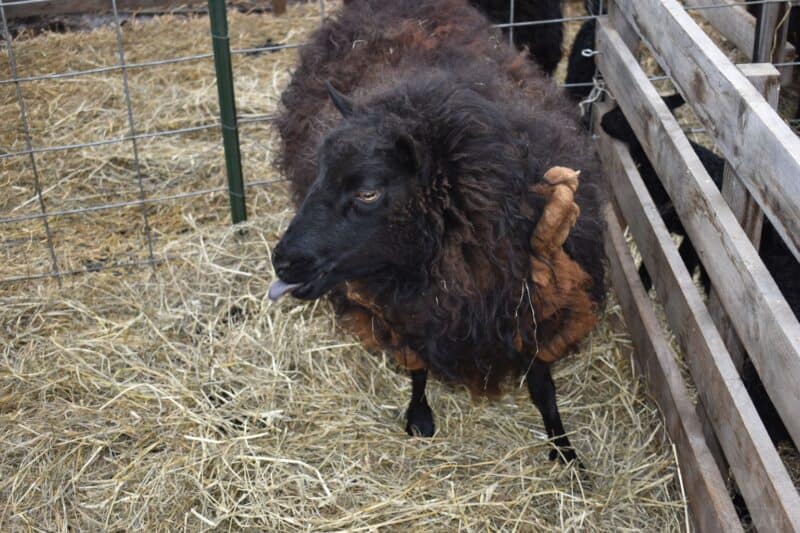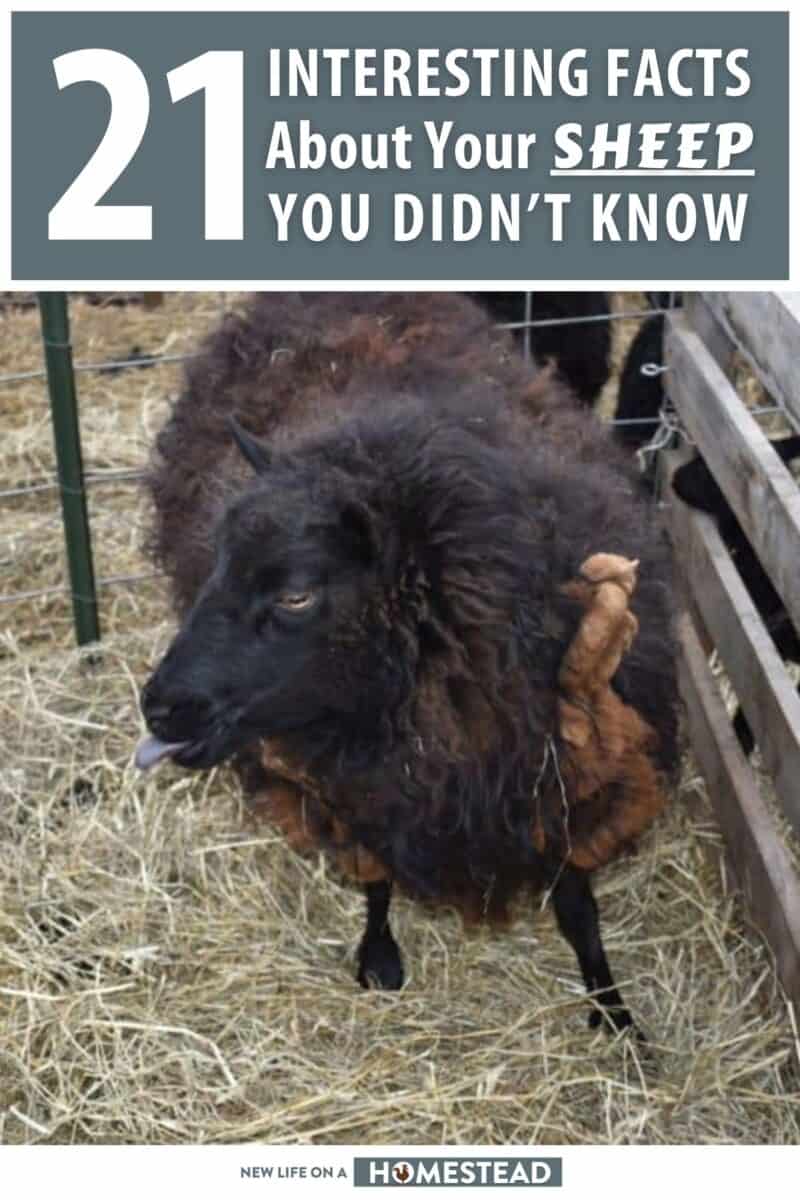It’s easy to take the things we see every day for granted, and that certainly includes the livestock animals we take care of.

If you’ve ever seen a flock of sheep trotting around the pasture or lazily munching on grass, it’s easy to think they don’t have much going on. But you’d be wrong!
Sheep are in actuality fascinating animals, individually and socially, and there’s a lot more to admire about them than the wool they provide us- although that wool is more amazing than you know!
Below you will find 21 interesting facts about sheep that you probably didn’t know…
1. Sheep are Surprisingly Smart
Sheep are intelligent and demonstrate remarkably good problem-solving capabilities.
Sheep will learn different routes around the area they typically inhabit, and have demonstrated repeatedly that they can overcome obstacles standing between them and food, including latches on gates.
Their overall intellect also contributes to a surprisingly refined social structure and relationships with other sheep and humans, as we will learn later.
2. Sheep Can Actually Swim (But Not Too Well)
There’s an old wives’ tale that says sheep cannot swim and sink like a stone.
That’s just not true: sheep can in fact swim, and will often ford rivers and streams in order to reach better grazing areas or to escape predators.
But sheep aren’t great swimmers because their wool creates lots of drag that can be acted on by a current and it is prone to snagging on underwater obstacles.
That being said, you should never depend on a water feature to keep your sheep on your property!
3. Most Sheep are Immune to Snake Venom
Amazingly, most sheep tend to be immune to venom or definitely resistant to it from certain snakes, namely from pit vipers.
This is because sheep have a special compound in their bloodstream known as ovine heterophilic immunoglobin which essentially neutralizes the venom before it can cause major harm.
A snake bite can still seriously hurt a sheep and result in lasting injury, but they’re far less vulnerable than most mammals.
Also, fun fact, this same compound is used to create antivenin that saves the lives of people and other animals!
4. Most Domestic Sheep are Smaller than Wild Sheep
Some domestic sheep breeds get pretty big, with large adults weighing several hundred pounds but they don’t compare to many wild sheep species.
The mountain sheep of North America and Asia can weigh upwards of 450 pounds and are surprisingly huge, strong animals!
A rowdy domestic sheep is hard enough to handle; I definitely wouldn’t want to tangle with one of those monsters!
Obviously, domestic sheep or selectively bred over many long generations for their smaller, safer size.
5. Sheep Don’t Make Great Pets
There’s hardly anything more appealing than a perfectly fluffy and friendly sheep, and this has led some people to keep them strictly as pets.
However, a sheep does not make a great pet. They can form a bond with you, but sheep are only healthy in a flock structure with multiple other sheep.
Denied this social structure, many sheep develop behavioral problems or even illnesses! You can have sheep as pets, but you’ll want to get at least six or seven- a big investment and an expensive proposition!
6. Sheep Can be Milked, Too
Sheep are known for producing wool which is a foundational material in the textile industry, but they also produce milk.
Sheep milk is very rich, tasty and extremely nutritious, and it can be used for pretty much all the same products that cow’s milk can.
It is rarely seen here in America, but is extremely popular elsewhere in the world and is definitely a viable option for keeping your family in milk on the homestead.
7. Sheep are Strictly Herbivores
Sheep only eat plants, particularly grass and hay, meaning they are herbivores.
Sheep don’t eat meat, and if they eat foods that have animal protein in them, it can easily make them terribly sick.
Accordingly, you never want to substitute animal feed from carnivorous species as an element in your sheep’s diet, and take care to keep them from getting into the food from those animals.
As long as your sheep enjoy a balanced diet of grass and other plant matter, they will stay happy and healthy.
8. Your Sheep Will Remember You!
Remember when I said that sheep are intelligent? That intellect also gives them a great memory.
It’s thought that your average sheep has a working memory adequate to remember about 50 faces… Obviously those of other sheep in the flock but also the faces of people!
Sheep can remember even their own name if you use it frequently enough.
If you work sheep see you every day they will definitely remember you, and if you treat them well or poorly they will remember that too!
And speaking of faces, sheep also know if you’re happy or angry based on your facial expression.
9. A Flock of Sheep Has an Intricate Social Hierarchy
If you’ve ever seen a flock of sheep huddled tightly together and wandering across the pasture, you might think it’s a case of the blind leading the blind but that isn’t so.
Sheep have an intricate social hierarchy consisting of dominant males and dominant females with underlings that establish a sort of pecking order when it comes to decision-making, access to food and other factors.
You might not be able to tell from the sounds they make, but there’s plenty of jockeying for position among peers in that flock!
10. Sheep Have a Very Wide Field of View
Sheep have a tremendously wide field of view, depending on the breed and other factors between 270° and 320°.
That is nearly all around them, and they can see in this field without moving their heads.
This is because sheep are prey animals, meaning constant surveillance and early detection of predators is paramount to their survival and to alerting the rest of the flock as quickly as possible.
Other mammals like cows, goats and horses have similarly wide fields of view for the same purpose.
11. Sheep Have Rectangular Pupils
If you look closely at the eye of a sheep, you might notice that they have a rectangular pupil.
This, in conjunction with the placement of their eyes on their head, contributes to that amazing field of view that we just talked about.
It also gives them a unique, and slightly eerie appearance. But don’t let that bother you: your sheep are probably plenty happy to see you with those rectangular eyes!
12. Male and Female Sheep May Have Horns
Both male and female sheep may have horns, although as a rule, males will always have bigger, thicker, longer horns.
13. Not All Sheep Breeds Grow Horns
However not all domestic sheep breeds have horns. Some breeds are known as polled, meaning they’ve been specially bred to lack horns naturally.
But, sometimes horns will still express themselves in a certain line of sheep, and in other breeds only the females will be polled.
14. A Male Sheep is a Ram
A male sheep is known as a ram. As soon as a sheep is a year old or older it is no longer a lamb, and if it is a male, it will be considered a ram if it is left sexually intact.
15. A Female Sheep is a Ewe
Likewise, female sheep that reach at least one year of age are known as ewes.
16. Ewes Only Give Birth to One or Two Lambs at a Time
When sheep reproduce, they typically only give birth to one and sometimes two lambs at a time, and although triplets are not completely unheard of they’re quite rare.
Unlike smaller mammals, the long gestation period and small reproductive numbers of sheep means that flocks tend to grow slowly.
17. An Average Fleece Will Weigh Less than 8 Pounds
If you’ve ever seen a sheep’s fleece, meaning all of its wool, removed in one piece it looks huge, bulky and heavy but it really isn’t. An average mature sheep’s fleece will usually weigh less than eight pounds altogether.
18. Different Breeds of Sheep Produce Wool of Varying Quality
All sheep that will grow wool can have their wool harvested and turned into usable products, but the quality of a sheep’s wool has a lot to do with its breed.
Simply, different breeds of sheep produce different grades of wool. One of the most popular and coveted is Merino wool, but others include Cotswold and Romney.
19. Sheep Have Been Domesticated for Thousands of Years
Sheep have been domesticated for at least 10,000 years and probably longer. People have been benefiting from their wool, milk and meat the entire time.
20. Wool Will Keep Sheep (and You) Warm Even When Soaking Wet
Wool is a remarkable material, both when it’s still on the sheep and when it has been turned into garments.
It is naturally antibacterial, but most remarkably it retains its insulating properties even when it is soaking wet; that means it can still keep you warm even when you’re drenched!
21. Most Domestic Sheep Can Live Around 10 Years
An average domestic sheep can live a long time, averaging about 10 years of age given appropriate care and nutrition.
Some breeds won’t live quite as long, but others will typically live longer. That means your sheep can be with you for a significant part of your life.

Tom has lived and worked on farms and homesteads from the Carolinas to Kentucky and beyond. He is passionate about helping people prepare for tough times by embracing lifestyles of self-sufficiency.
